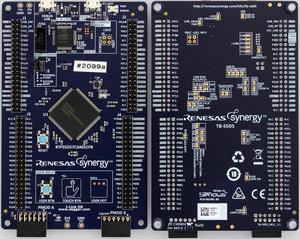Tracing on Renesas Synergy R7FS5D5
This article describes how to get started with trace on the Renesas Synergy R7FS5D5 MCU. This article assumes that there is already a basic knowledge about trace in general (what is trace, what different implementations of trace are there, etc.). If this is not the case, we recommend to read Trace chapter in the J-Link User Manual (UM08001). The Renesas Synergy R7FS5D5 MCU implements tracing via pins , so a J-Trace can be used for tracing.
Minimum requirements
In order to use trace on the Renesas Synergy R7FS5D5 devices, the following minimum requirements have to be met:
- J-Link software version V6.40 or later
- Ozone V2.60h or later (if streaming trace and / or the sample project from below shall be used)
- J-Trace PRO for Cortex-M HW version V1.0 or later
Sample project
Streaming trace
The following sample project is designed to be used with J-Trace PRO and Ozone to demonstrate streaming trace. The project has been tested with the minimum requirements mentioned above and a Synergy TB-S5D5 eval board. The sample project comes with a pre-configured project file for Ozone that runs out-of-the box. In order to rebuild the sample project, SEGGER Embedded Studio can be used.
Renesas_Synergy_S5D5_Trace_Example.zip
